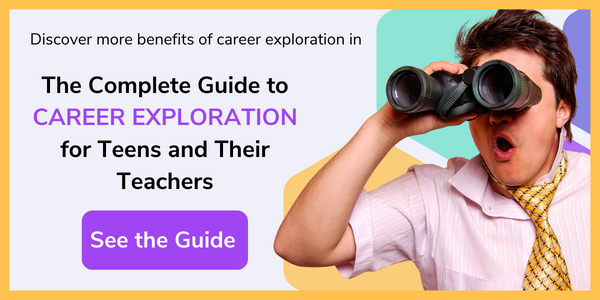5 Benefits of Early Career Exploration for Grades 6-9
by Lee Taal on 10 Aug, 2021
Early career exploration is important for young students to plan for the future, and to feel more secure and happy along the way. Exploring different career pathways, through programs such as ChatterHigh’s Daily Quiz or other online and in-person resources, has many benefits.
TL;DR
Research shows that middle school students are interested in beginning their career exploration adventure, so why wait? Especially when there are so many benefits of career exploration for pre-teen and teenage students.
- Builds self-awareness and fosters hope
- Develops vocational identity
- Equips students to better plan their courses in high school
- Sparks meaningful conversations with adults
- Improves motivation, engagement, and overall performance in school
Read on to learn more about how middle school career exploration contributes to these positive outcomes for youth now and in the future.
Career exploration can start in elementary school but it becomes increasingly important as students begin to make their own course choices in high school. Research suggests that middle school is the most effective time for career guidance. In an ASA study of middle school students, they found that 87% of middle school students are interested in ways to match their specific skills and interests with potential careers, and 85% are interested in ways to learn the education and experience requirements needed for the careers they are interested in.
Benefits of Early Career Exploration :
1. Builds self-awareness and fosters hope
Besides being an exploration of the professional environment, career exploration is an exploration of the self. To really dive into career exploration, students must clarify what is important to them. They must reflect on areas like their interests, values, and skills. However, this self-reflection doesn't just benefit them within the context of career exploration. In fact, research shows that increased self-awareness helps students to become more confident and creative, build stronger relationships, and improve communication skills. It's even linked to higher levels of happiness.
“There are a number of resources, including ChatterHigh, that focus on self-awareness, helping individuals to ensure their chosen directions are grounded in an understanding of their own interests, values, strengths and preferences.”
-Sareena Hopkins, Executive Director, Canadian Career Development Foundation (CCDF)
But career exploration doesn't just help students build self-awareness. It also fosters hope. Hope can be defined as a cognitive trait centred on achieving goals through agency and pathways. In other words, it is the result of having the will and the way to accomplish one's goals. Career exploration creates an environment where students have the opportunity to discover both their passions and the pathways to their goals, and therefore become hopeful.
2. Develops vocational identity

Vocational identity is an individual's self-defined occupational goals, interests, values, and roles. It's a core structure within self-concept characterized by clarity, coherence, and stability of perceived occupational motivation and abilities. Early career exploration can help students start to build this identity through learning more about what interests and motivates them.
Through ChatterHigh's gamified seek-and-find platform, students are exposed to a multitude of different occupations and they can unlock in-depth interest reports along the way. They can then review these reports along with their career counsellors or parents. Students are exposed to information that helps them to identify the way forward and they can start setting goals to help them get there.
3. Equips students to better plan their courses in high school
Students entering high school have new freedom to select courses of interest, but choosing the right ones for the future is important. Career education and exploration activities can help students discover and evaluate their options based on their interests and values, enabling them to map the pathway ahead. That pathway includes choosing the right courses and setting personal goals.
Having a plan in place can also build confidence and create a newfound motivation to work towards a goal. No one wants to waste their time and energy taking courses that they have no interest in and that have little value for the future. With confidence and motivation, success is more likely.
4. Sparks meaningful conversations with adults

It is exciting to share new ideas, goals, and aspirations with those around you. In fact, research shows that 88% of students speak to their families about their career options. Creating an education or career path with help from parents, guidance counsellors, teachers or other significant figures in a student's life can help nurture and build relationships. Topics related to post-secondary plans can be a great start to meaningful conversations.
Interested in starting a conversation but not sure how to get it going? Read more on how to have career discussions with teens.
5. Improves motivation, engagement, and overall performance at school
Having a goal is motivating, which is why career exploration improves student motivation and engagement. Career exploration allows students to discover post-secondary pathways and generate post-secondary plans. And what is a plan if not a series of goals? These pathways and plans — these goals — give students a reason to work hard in school, engage in lessons, and take ownership of their learning. As a result, this often leads to improved academic performance. In fact, a recent study demonstrated that students who engaged in high levels of career exploration and planning "showed significantly higher levels of academic self-efficacy and academic motivation" than other students.
“If you want to live a happy life, tie it to a goal, not to people or things.”
-Albert Einstein
We already mentioned that career exploration helps foster hope in students. However, we didn't mention that hope has been proven to predict objective academic achievement better than intelligence, personality, and previous academic achievement. Hope also has an impact on outlook, resilience, and actions. Again, we see how goals lead to motivation. As students discover their path, make a plan, and set goals, they become motivated and hopeful, and that hope fuels further motivation because students believe they can achieve their goals.
Conclusion
We all want students to be happy, self-aware, hopeful, and motivated. Sometimes it's just a matter of finding the tools and time to make it happen. But that's why ChatterHigh exists, to equip you with free, fun, easy, and accessible tools so your students can engage in meaningful career exploration. Not only that, but teachers can easily track student progress and guidance counsellors can use ChatterHigh to help students plan their courses throughout high school to make sure their classes are aligned with their future plans for university, trades, or other skills training.
To learn more, create your free account, book a demo, or check out The Complete Guide to Career Exploration for Teens and Their Teachers.

